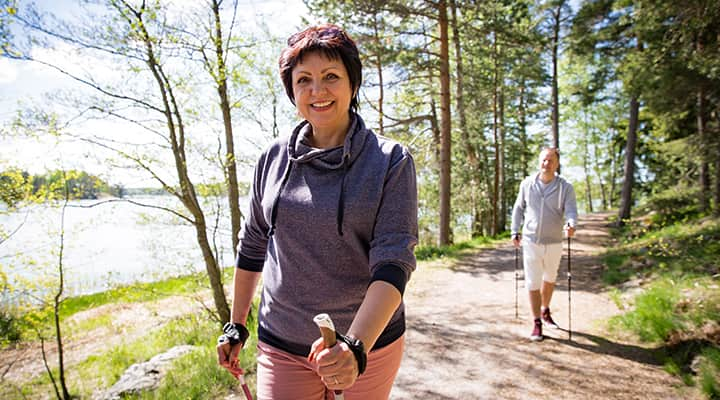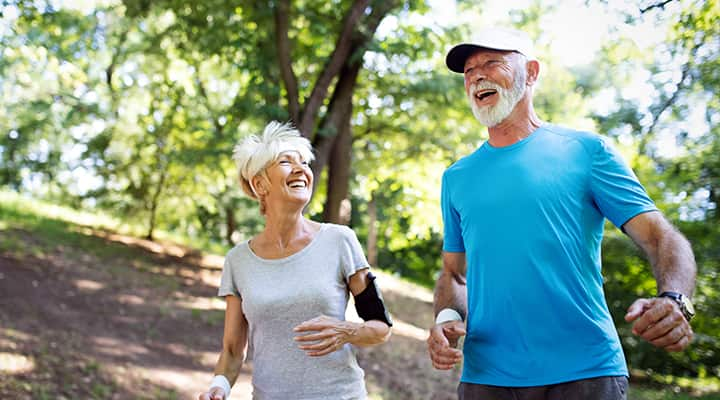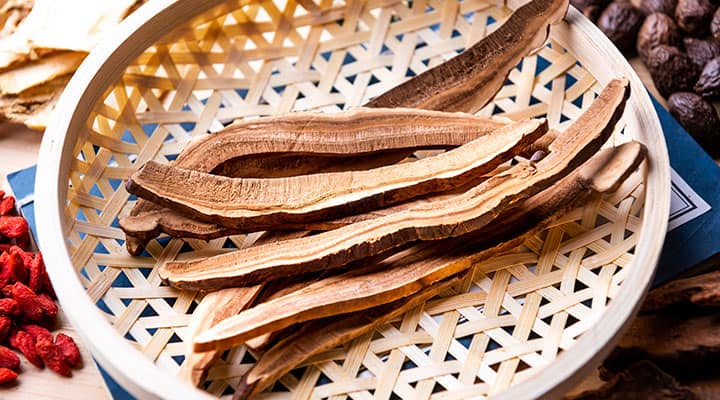
The 3 Best Nutrients for Strong Bones & Joints
Published: February 2021

Your bones hold you upright. Your joints make it possible to move those bones around comfortably (walking, sitting, running, etc.). Like every other part of you, your bones and joints need the right nutrients to stay healthy. Figuring out which ones—then dialing in your diet to get enough of them—is the tricky part.
Especially because calcium gets most of the credit when it comes to bone health. But in fact, the three nutrients you should be doubling down on are ones you might not know much about: vitamin K2, collagen and glucosamine. Here's why they're at the top of our list.
Fight osteoporosis with vitamin K

We know bone health revolves around calcium, but it isn't the whole story. Two specialized kinds of cells build and break down bone, allowing for a perpetual building and renewal processes. Osteoblasts build your bones by attaching calcium and other minerals to it, and osteoclasts break down what isn't serving your body anymore, so your body can rebuild.
Bone loss happens when those bone-breaking cells are working harder than the bone-building cells. The end result of this reduction in bone density, unfortunately, is debilitating osteoporosis. According to the International Osteoporosis Foundation, 1 in 3 women and 1 in 5 men over 50 years will suffer a break because of this disease.
But here's where vitamin K can be your body's unsung hero: it helps activate a protein called osteocalcin that acts as a glue, helping bind calcium to the bone matrix. When enough vitamin K2 is present (specifically, the kind called menaquinone- or MK-4), it can prevent or even reverse the loss of bone mineral density that comes before osteoporosis. This goes a long way towards preventing the worst part about bone density loss: fractures that take a long, long time to heal.
You'll find vitamin K2 in dairy, fermented foods, and some meats, but it's unlikely that you're eating enough of these foods for maximum protection against osteoporosis, even if you're an avid cheese lover! Studies show that you have to get about 45,000 mcg vitamin K2 (or 45 mg) of K2 a day to see improvements in bone density. What's more it has to be K2 MK-4.
Important safety note: there are some serious drug interactions that can occur with high-dose vitamin K, so be sure to speak with your doctor before dosing.Protect against osteoarthritis with collagen

Up to a third of your entire body is collagen—it is in your teeth, cartilage, bones, skin and even your eyes. Because collagen is another structural component of your bones, age-related collagen loss can also contribute to decreased bone mineral density, increasing bone fragilitysometimes to the point that osteoarthritis occurs.
People who suffer from this disease often have swollen, painful jointsand there's no short supply of unlucky members of this club. According to the Arthritis Foundation, osteoarthritis is the most common form of arthritis.
While there's no cure
for osteoarthritis, collagen can help promote healthy joints. How? Think of your joints as cushions that keep the bones in your joints from grinding against one another (ouch!). If you've ever had a pet tear all the stuffing out of a pillow, you know that it a) makes a mess and b) does not remain a usable pillow for very long. Collagen helps hold all that stuffing
inside your joints.
Fibroblasts are cells that produce collagen naturally, but over time, they have less raw material to work with. You can encourage youthful levels of collagen by intaking a highly absorbable form of collagenand many of the conventionally available are not absorbable.
Hydrolyzed collagen, on the other hand, fits this bill. And, there is clinical research to prove it: during a randomized, placebo-controlled trial, 250 people with osteoarthritis where given 10 grams of hydrolyzed collagen every day for 6 months. They reported significant improvements in knee painand those with the greatest joint deterioration benefited most!
Please your knees with glucosamine

Speaking of knees, there's another nutrient out there that can help with osteoarthritis pain: glucosamine. In your body, this amino sugar can be found keeping the cartilage in your knees (and other joints) strong and comfortable. But like collagen, glucosamine levels decline over time.
There are multiple types of glucosamine: glucosamine sulfate, glucosamine hydrochloride and N-acetyl glucosamine. Glucosamine sulfate is the one with the best clinical results. Note, though, that knee support is a marathon, not a sprint. The meta-analysis of scientific studies regarding glucosamine all point to the same observation: the best results happened when those suffering from osteoarthritis took glucosamine for years.
Glucosamine is often paired with chondroitin, another nutrient that is found naturally in your joints. Together, studies show that these two nutrients can deliver comparable effects to certain arthritis drugs.
Be proactive to keep your bones and joints healthy and strong
You might not know you have osteoporosis or bone until you suffer a fracture, and by then it's often too late to restore your bone strength. That's why it pays to be proactive: vitamin K2 as well as collagen are great nutrients to keep your bones strong.
Collagen also helps keep your joints healthy and comfortable. For those seeking long-term relief, glucosamine can help. Of course, your best bet is to work with your doctor if you're concerned about any of these ailmentsthey'll help put together a treatment regimen that will help you keep on moving strong!
References
- Asakura, H et al. "Vitamin K administration to elderly patients with osteoporosis induces no hemostatic activation, even in those with suspected vitamin K deficiency." Osteoporos Int, National Center for Biotechnology Information, National Library of Medicine, December 2001, https://pubmed.ncbi.nlm.nih.gov/11846334/.
- Benito-Ruiz, P et al. "A randomized controlled trial on the efficacy and safety of a food ingredient, collagen hydrolysate, for improving joint comfort" Int J Food Sci Nutr., National Center for Biotechnology Information, National Library of Medicine, February 2009, https://pubmed.ncbi.nlm.nih.gov/19212858/.
- Young, Ho Lee et al. "Effect of glucosamine or chondroitin sulfate on the osteoarthritis progression: a meta-analysis." Rheumatol Int., National Center for Biotechnology Information, National Library of Medicine, June 2009, https://pubmed.ncbi.nlm.nih.gov/19544061/.



